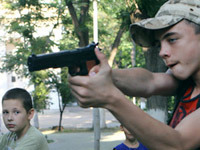Guns for people in Russia: To be or not to be?

Incidents of attacks against common people with the use of guns may push Russian authorities towards revising the rules of possession of weapons and approving stricter standards for civilian firearms trafficking in the Russian Federation. At the same time, it would be advisable to raise the responsibility of gun owners via civic associations, such as shooting clubs.
The crime in Russia's Belgorod committed on April 22 caused another round of debate about the right to carry arms in the Russian Federation. Supporters of legalization of firearms say that it could be possible to prevent the "massacre in Belgorod" if there was a trained and responsible owner of firearms among eyewitnesses. Similar arguments were raised in the context of another high-profile case of "Office Killer" Vinogradov, who shot his colleagues at a major pharmaceutical company. To prove their point, such people refer to examples of relatively favorable outcomes of similar practices in other countries (primarily the United States).
Also read: Americans, never give up your guns
In Russia, the admission to firearms is associated with a complex of procedures, which, however, do not give guarantees of gun owner's responsibility. Even those who support the legalization of firearms acknowledge that the public culture of weapon handling is extremely low in Russia. The skills that Russian male citizens obtain during army service very often remain the only methodological guide for owners of civilian firearms of self-defense. However, the army gradually ceases to be the "school of life" to many Russians.
A public opinion poll conducted on the subject showed a lack of awareness of citizens about technical characteristics of most common types of traumatic weapons. Up to 30 percent of respondents found it difficult to tell the difference between traumatic and conventional firearms. More than 25 percent believe that traumatic weapons, in principle, are not life threatening at all. The problem is particularly acute for large cities, where up to 15 percent of residents use or used civilian firearms.
President Vladimir Putin expressed the position of opponents of free trafficking in arms in a recent interview. According to him, the number of guns that Russian people own is too large already. Stimulating the process of legalization can very dangerous, he concluded.
The State Duma has given the first reading to the bill about the radical increase in penalties for the use of firearms in cities, taking into account the aggravating factor of alcoholic and narcotic intoxication of shooters. The bill, declared as a response to increased "public shootings" in major cities of Russia, is seen as yet another measure to restrict people's right to self-defense.
In the U.S., where incidents of shooting in public places become commonplace and tragic practice, the task of tightening arms trafficking was said to be one of the priorities of the Obama Administration. However, the upper house of the Congress rejected relevant presidential amendments, even taking into account the overall readiness of public opinion in the U.S. to adopt the new rules limiting the effect of the Second Amendment to the U.S. Constitution, which guarantees the right to keep and bear arms. According to experts, the move to reject the amendments is connected both with successful lobbying campaigns conducted by arms manufacturers and with the active participation of public organizations of owners of small arms.
In Russia, organizations of civil gun owners enjoy rudimentary social-political influence, and hardly ever participate in the development of sector-specific legislation. In this regard, measures of the state to control the trafficking of civilian firearms are increasingly prohibitive. Associations of amateur shooters actively seek broader powers to control gun owners and strive for training programs for those willing to obtain shooting skills.
Julius Ivanov
Pravda.Ru
Subscribe to Pravda.Ru Telegram channel, Facebook, RSS!




